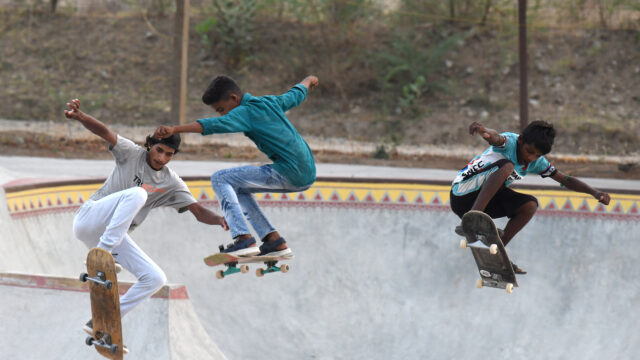Sometime in 2017-18, Makijany was discussing her upcoming film on skating for an international OTT platform with her sister Manjari Makijany and her husband Emmanuel Pappas. During the discussion, Manjari came up with an idea to build an original brick-and-mortar skatepark instead of a studio set.

It was a difficult decision since it would escalate costs five-fold apart from incurring regular expenditures for maintenance. But the trio decided to go ahead with their decision as they felt just making a film wouldn’t be enough. It would serve the community well if a permanent piece of infrastructure could also be built.

For days, they scouted for a perfect location. Eventually, they decided to build it in Rajasthan to promote sports and extend an opportunity to young girls, who, especially in rural areas, are almost forced to do all the household chores and don’t get an opportunity to explore the world outside their homes and try their hand at leisure activities.

“We wanted to push for women’s empowerment. From the beginning we wanted the community to use the infrastructure for free after we had finished shooting our film. Apart from driving hundreds of kilometres and talking to hundreds of children, especially girls, across the region and from different villages, we also analysed statistics such as the number of young students, schools, accessibility etc. to ensure that the maximum number of children benefited from it.” says Vinati.
One day, while driving through Khempur village near Udaipur city, they came across a group of children playing with a makeshift cart that was quite similar to a skateboard. At that moment they felt a certainty that this was the spot for their dream project. The spot was a mere 40-minute drive from Udaipur, India’s spectacular city of lakes.

They bought a piece of land around 50,000 sq ft in the village and employed an expert organisation to construct the skatepark. It took them 45 days to build a park with a built-up area of 14,500 sq ft.

The trio started filming Skater Girl in 2019. The film was released in 2020. Once the shoot was over, they opened it to the public albeit with a few conditions. Girls get priority and all children, irrespective of caste and class, could utilise the infrastructure.

Initially, they faced logistical difficulties in transporting construction materials to the site. Locals too were sceptical and unenthusiastic in the beginning to send their children, especially their daughters to the skatepark.
But with the continuous engagement and counselling sessions by volunteers, many turned up and began practising.

“These children are skilful and have picked up the skill very fast compared to their city-based peers. I am fortunate to work with them,” said Jewel Paul, a volunteer and adventure sports enthusiast from Tripura. Jewel is a YouTuber who had explored many other locations before he joined Desert Dolphin Park as a volunteer trainer. “Rajasthan is hot and dry unlike my home state, but I am in love with its beauty and its people. This park has the best infrastructure I have come across by far.” he added.

Skating has become a favourite pastime for the local children today. They also performed with flying colours for their state at the national meet. However, they are always in need of more skateboards as these wear out fast. They could certainly also benefit from more encouragement and support.

While the film travels across the globe and proves how sports can be a life-changer, the Desert Dolphin Skatepark, the only such facility in Rajasthan, is a testimony to how sports infrastructure can become a driver of social uplift. The lessons have encouraged Vinati and Manjari to try and replicate the model in other locations to serve more children.




